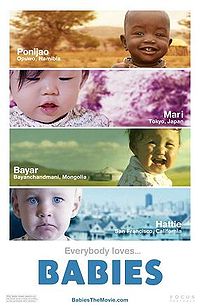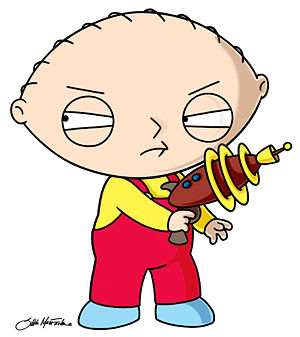
From a fascinating article in this weekend’s NY Times magazine by Paul Bloom detailing some recent research into the subject Baby Morality. Prime 2 Cor 2:14 material, with some heavy doses of original sin. Some excerpts:
Why would anyone even entertain the thought of babies as moral beings? From Sigmund Freud to Jean Piaget to Lawrence Kohlberg, psychologists have long argued that we begin life as amoral animals. One important task of society, particularly of parents, is to turn babies into civilized beings — social creatures who can experience empathy, guilt and shame; who can override selfish impulses in the name of higher principles; and who will respond with outrage to unfairness and injustice. Many parents and educators would endorse a view of infants and toddlers close to that of a recent Onion headline: “New Study Reveals Most Children Unrepentant Sociopaths.” If children enter the world already equipped with moral notions, why is it that we have to work so hard to humanize them?
A growing body of evidence, though, suggests that humans do have a rudimentary moral sense from the very start of life. With the help of well-designed experiments, you can see glimmers of moral thought, moral judgment and moral feeling even in the first year of life. Some sense of good and evil seems to be bred in the bone. Which is not to say that parents are wrong to concern themselves with moral development or that their interactions with their children are a waste of time. Socialization is critically important. But this is not because babies and young children lack a sense of right and wrong; it’s because the sense of right and wrong that they naturally possess diverges in important ways from what we adults would want it to be.
—————-
Human babies, notably, cry more to the cries of other babies than to tape recordings of their own crying, suggesting that they are responding to their awareness of someone else’s pain, not merely to a certain pitch of sound. Babies also seem to want to assuage the pain of others: once they have enough physical competence (starting at about 1 year old), they soothe others in distress by stroking and touching or by handing over a bottle or toy. There are individual differences, to be sure, in the intensity of response: some babies are great soothers; others don’t care as much. But the basic impulse seems common to all.
Babies probably have no conscious access to moral notions, no idea why certain acts are good or bad. They respond on a gut level. Indeed, if you watch the older babies during the experiments, they don’t act like impassive judges — they tend to smile and clap during good events and frown, shake their heads and look sad during the naughty events (remember the toddler who smacked the bad puppet). The babies’ experiences might be cognitively empty but emotionally intense, replete with strong feelings and strong desires. But this shouldn’t strike you as an altogether alien experience: while we adults possess the additional critical capacity of being able to consciously reason about morality, we’re not otherwise that different from babies — our moral feelings are often instinctive. In fact, one discovery of contemporary research in social psychology and social neuroscience is the powerful emotional underpinning of what we once thought of as cool, untroubled, mature moral deliberation.
—————
What do these findings about babies’ moral notions tell us about adult morality? Some scholars think that the very existence of an innate moral sense has profound implications. In 1869, Alfred Russel Wallace, who along with Darwin discovered natural selection, wrote that certain human capacities — including “the higher moral faculties” — are richer than what you could expect from a product of biological evolution. He concluded that some sort of godly force must intervene to create these capacities. (Darwin was horrified at this suggestion, writing to Wallace, “I hope you have not murdered too completely your own and my child.”)
 A few years ago, in his book “What’s So Great About Christianity,” the social and cultural critic Dinesh D’Souza revived this argument. He conceded that evolution can explain our niceness in instances like kindness to kin, where the niceness has a clear genetic payoff, but he drew the line at “high altruism,” acts of entirely disinterested kindness. For D’Souza, “there is no Darwinian rationale” for why you would give up your seat for an old lady on a bus, an act of nice-guyness that does nothing for your genes. And what about those who donate blood to strangers or sacrifice their lives for a worthy cause? D’Souza reasoned that these stirrings of conscience are best explained not by evolution or psychology but by “the voice of God within our souls.”
A few years ago, in his book “What’s So Great About Christianity,” the social and cultural critic Dinesh D’Souza revived this argument. He conceded that evolution can explain our niceness in instances like kindness to kin, where the niceness has a clear genetic payoff, but he drew the line at “high altruism,” acts of entirely disinterested kindness. For D’Souza, “there is no Darwinian rationale” for why you would give up your seat for an old lady on a bus, an act of nice-guyness that does nothing for your genes. And what about those who donate blood to strangers or sacrifice their lives for a worthy cause? D’Souza reasoned that these stirrings of conscience are best explained not by evolution or psychology but by “the voice of God within our souls.”
—————-
The biologist Richard Dawkins was right, then, when he said at the start of his book “The Selfish Gene,” “Be warned that if you wish, as I do, to build a society in which individuals cooperate generously and unselfishly toward a common good, you can expect little help from biological nature.” Or as a character in the Kingsley Amis novel “One Fat Englishman” puts it, “It was no wonder that people were so horrible when they started life as children.”
Babies possess certain moral foundations — the capacity and willingness to judge the actions of others, some sense of justice, gut responses to altruism and nastiness. Regardless of how smart we are, if we didn’t start with this basic apparatus, we would be nothing more than amoral agents, ruthlessly driven to pursue our self-interest.

COMMENTS
One response to “The Moral Life Of Babies”
Leave a Reply














I love this part:
Just as critics describe much of experimental psychology as the study of the American college undergraduate who wants to make some extra money or needs to fulfill an Intro Psych requirement, there’s some truth to the claim that this developmental work is a science of the interested and alert baby.